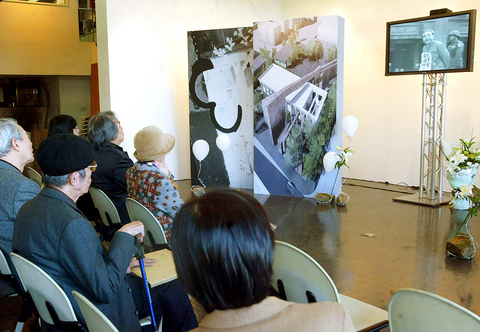A series of events to commemorate the 60th anniversary of the 228 Incident and the 20th anniversary of the end of martial law began yesterday with the release of a documentary.
The 228 Incident took place in 1947, when Chinese Nationalist Party (KMT) troops suppressed an uprising, leaving tens of thousands dead, missing or imprisoned.
After the uprising, martial law was briefly imposed and then maintained from 1949 until 1987.

PHOTO: CNA
The documentary, Taiwan's Love, was sponsored by the Council for Cultural Affairs (CCA) with the goal of presenting the 228 Incident and the White Terror era through the eyes of the victims, filmmaker Peng Chia-ju (彭家如) said.
Most films focusing on these events are rather political, Peng said, "so we wanted to present a more objective approach to this topic."
Former political prisoners are the focus of the documentary, in which they talk about their personal experiences and emotions during and since the 228 Incident and White Terror.
"It's been almost 40 years since I got out of jail and I haven't made any new friends," said Chen Meng-ho (陳孟和), a former political prisoner.
Chen was arrested for "reading socialist books" in 1949 and imprisoned for 15 years.
"I've never gotten in touch with my old friends either. I've been too afraid that people would be afraid of me," he continued. "I've imprisoned myself," he said.
Chen explained the source of his fear.
He once ran into a close cousin on the street after his release. As he approached his cousin, his cousin said: "I don't know you," and quickly turned away.
"He [the cousin] was not the only person like that," Chen added.
Another political prisoner pre-sents his story. Huang Chiu-shuang's (黃秋爽) entire family was arrested in 1950 because a friend of her father supportive of socialism had once stayed at their home, she said.
"They arrested my parents, my brother, my two sisters, my sister's child and me," Huang said.
Her father was quickly executed, and the rest of the family was released afterwards, she said.
However, they had to live under constant harrassment from the secret service, she said.
"Whenever we moved to a new place, secret service agents would talk to neighbors about us and the landlord would kick us out," she said.
The secret service even interfered with Huang's intimate relationships.
"Whenever someone wanted to ask me out for a date, they would tell him: `She's the daughter of a communist,' to scare him away," Huang said.
The stories of former political prisoners recorded in the documentary are only the tip of the iceberg.
Roger Hsieh (
By making the documentary, the filmmaker hoped to provoke public interest in the issue.
"We can't record everyone's experiences," Peng said, "but we hope whoever watches this documentary will want to find out more about what happened."

Alain Robert, known as the "French Spider-Man," praised Alex Honnold as exceptionally well-prepared after the US climber completed a free solo ascent of Taipei 101 yesterday. Robert said Honnold's ascent of the 508m-tall skyscraper in just more than one-and-a-half hours without using safety ropes or equipment was a remarkable achievement. "This is my life," he said in an interview conducted in French, adding that he liked the feeling of being "on the edge of danger." The 63-year-old Frenchman climbed Taipei 101 using ropes in December 2004, taking about four hours to reach the top. On a one-to-10 scale of difficulty, Robert said Taipei 101

Nipah virus infection is to be officially listed as a category 5 notifiable infectious disease in Taiwan in March, while clinical treatment guidelines are being formulated, the Centers for Disease Control (CDC) said yesterday. With Nipah infections being reported in other countries and considering its relatively high fatality rate, the centers on Jan. 16 announced that it would be listed as a notifiable infectious disease to bolster the nation’s systematic early warning system and increase public awareness, the CDC said. Bangladesh reported four fatal cases last year in separate districts, with three linked to raw date palm sap consumption, CDC Epidemic Intelligence

Taiwanese and US defense groups are collaborating to introduce deployable, semi-autonomous manufacturing systems for drones and components in a boost to the nation’s supply chain resilience. Taiwan’s G-Tech Optroelectronics Corp subsidiary GTOC and the US’ Aerkomm Inc on Friday announced an agreement with fellow US-based Firestorm Lab to adopt the latter’s xCell, a technology featuring 3D printers fitted in 6.1m container units. The systems enable aerial platforms and parts to be produced in high volumes from dispersed nodes capable of rapid redeployment, to minimize the risk of enemy strikes and to meet field requirements, they said. Firestorm chief technology officer Ian Muceus said

MORE FALL: An investigation into one of Xi’s key cronies, part of a broader ‘anti-corruption’ drive, indicates that he might have a deep distrust in the military, an expert said China’s latest military purge underscores systemic risks in its shift from collective leadership to sole rule under Chinese President Xi Jinping (習近平), and could disrupt its chain of command and military capabilities, a national security official said yesterday. If decisionmaking within the Chinese Communist Party has become “irrational” under one-man rule, the Taiwan Strait and the regional situation must be approached with extreme caution, given unforeseen risks, they added. The anonymous official made the remarks as China’s Central Military Commission Vice Chairman Zhang Youxia (張又俠) and Joint Staff Department Chief of Staff Liu Zhenli (劉振立) were reportedly being investigated for suspected “serious